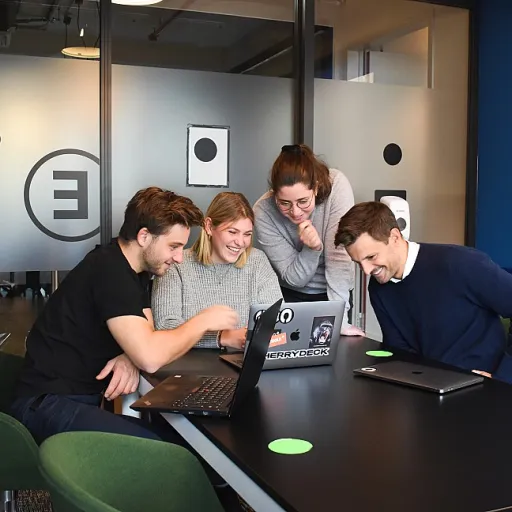
Understanding the basics of expected vs unexpected behaviors
Defining Expected and Unexpected Behaviors in Mentoring
In professional mentoring, understanding the difference between expected and unexpected behaviors is essential for both mentors and mentees. Expected behaviors are those actions and attitudes that align with the shared goals, values, and norms of the mentoring relationship. These might include active listening, timely communication, and mutual respect. Unexpected behaviors, on the other hand, are actions that fall outside these norms. They can disrupt the flow of learning, create confusion, or even undermine trust between participants.
Why Behavioral Expectations Matter
Setting clear expectations helps create a safe and productive environment for growth. In many ways, this mirrors what happens in a classroom or during school counseling sessions, where students learn social skills and emotional learning through structured activities. Just as in education, where teaching expected behaviors is crucial for group harmony, mentoring relationships benefit from clarity around what is considered appropriate or disruptive behavior.
- Expected behaviors: Consistent participation, openness to feedback, and respect for boundaries.
- Unexpected behaviors: Missed meetings, dismissive attitudes, or sharing confidential information without consent.
These concepts are not limited to the classroom or special education settings. They are equally relevant in professional environments, online learning, and small group mentoring activities. The ability to identify and address unexpected behaviors is a skill that supports both social emotional growth and professional development.
Connecting Social Thinking to Professional Growth
Social thinking, a concept often used in kindergarten grade and special education, is about understanding how our behaviors affect others in a group. In mentoring, this translates to being aware of how our actions—expected or unexpected—impact the learning and growth of both mentor and mentee. This awareness is foundational for building strong, resilient mentoring relationships and is a key part of teaching expected behaviors in any educational or professional context.
For a deeper dive into how mindsets and subtle dynamics influence mentoring, explore navigating mind games in professional development.
How expectations shape the mentoring relationship
The influence of expectations on mentoring dynamics
Expectations play a significant role in shaping the mentoring relationship, especially when considering both expected and unexpected behaviors. In professional mentoring, clear expectations help create a foundation for trust and effective communication. When mentors and mentees understand what behaviors are expected, such as active participation, respectful dialogue, and openness to feedback, the learning environment becomes more supportive and productive. Mentoring relationships often mirror classroom settings, where students' behaviors are guided by social and emotional learning principles. Just as in a school counseling session or a small group activity, setting clear expectations helps everyone know what is considered appropriate. This is especially important in special education or when teaching social skills to students in kindergarten grade or higher. By defining expected behaviors, mentors can teach social and emotional skills that are essential for professional growth. However, expectations are not just about rules. They also influence how both parties respond to unexpected behaviors. For example, if a mentee disengages during an online learning session or a group activity, it may signal a need to revisit the expectations or adapt the approach. This is similar to how teachers in a classroom might use a behaviors sort activity to help students identify which actions are expected and which are not.- Clear expectations reduce misunderstandings and create a safe space for learning.
- They help mentors and mentees navigate social and emotional challenges that arise during the mentoring process.
- Expectations guide the response to unexpected behaviors, making it easier to address issues constructively.
Common unexpected behaviors and their impact
Recognizing the Unexpected in Mentoring Dynamics
In professional mentoring, most people anticipate certain expected behaviors—such as punctuality, active listening, and respectful communication. However, unexpected behaviors can and do arise, often creating challenges for both mentors and mentees. These behaviors may not always be negative, but they can disrupt the flow of learning, social emotional growth, and the overall mentoring relationship.
- Passive participation: Sometimes, mentees or mentors may become less engaged than anticipated. This can look like minimal contribution in group activity discussions or a lack of follow-through on agreed actions. In online learning or small group settings, this behavior is particularly noticeable.
- Overstepping boundaries: Unexpected behaviors can include sharing personal information that is not relevant to the professional context, or making requests that fall outside the mentoring agreement. This can be especially challenging in special education or school counseling environments, where clear boundaries are essential for effective teaching and learning.
- Resistance to feedback: While feedback is a cornerstone of social emotional learning and professional growth, some students or mentees may react defensively or dismissively. This can hinder the development of social skills and the ability to adapt to new situations.
- Unpredictable attendance: Inconsistent participation—whether in a classroom, online, or free education setting—can disrupt the group dynamic and affect the grade or progress of the student or mentee.
- Social misunderstandings: Especially in kindergarten grade or grade social groups, mentees may misinterpret social cues, leading to behaviors that are unexpected in a professional or learning environment. This is where teaching expected behaviors and social thinking becomes crucial.
These common unexpected behaviors can impact the mentoring relationship by creating confusion, reducing trust, or slowing down progress. For mentors, recognizing these patterns is the first step toward addressing them. In some cases, a careful choice of words and communication style can help clarify expectations and guide the group or individual back on track.
Understanding the sort of behaviors expected in different settings—whether in school, special education, or professional environments—enables mentors to create a supportive atmosphere. This foundation is essential for teaching social skills, managing students behaviors, and fostering a positive learning experience for all involved.
Strategies for addressing unexpected behaviors
Practical Approaches to Responding to the Unexpected
When mentoring, unexpected behaviors can disrupt the flow of learning and challenge both mentors and mentees. Addressing these moments requires a thoughtful, flexible approach, especially when working with students or professionals in education, counseling, or social emotional learning environments. Here are some strategies that can help manage and redirect unexpected behaviors:- Clarify Expectations Early: Set clear guidelines for expected behaviors at the start of the mentoring relationship. This is especially important in group activities, online learning, or classroom settings where students may come from diverse backgrounds and have different understandings of social skills.
- Use Behavior Sort Activities: Incorporate activities where students or mentees sort behaviors into expected and unexpected categories. This can be particularly effective in special education, kindergarten grade, or small group settings, helping participants recognize the impact of their actions on the group and learning environment.
- Model Social Thinking: Demonstrate how to respond to unexpected behaviors in real time. For example, if a student interrupts during a school counseling session, calmly acknowledge the behavior and guide the group back to the activity. Modeling helps teach social and emotional learning skills expected in professional and educational settings.
- Encourage Reflection: After an unexpected behavior occurs, create space for reflection. Ask questions like, “How did this behavior affect our group activity?” or “What might be a more expected behavior next time?” This approach supports growth in social emotional skills and helps students or mentees internalize lessons.
- Adapt Teaching Strategies: Not all unexpected behaviors are disruptive; some may signal a need for different teaching or counseling approaches. Adjusting your methods based on the group or individual needs can foster a more inclusive and supportive learning environment.
The role of feedback in managing behaviors
Feedback as a Tool for Growth and Understanding
Feedback is a cornerstone in managing both expected and unexpected behaviors within professional mentoring. When mentors and mentees engage in open, constructive feedback, it helps clarify expectations and supports social emotional learning. This process is not just about correcting unexpected behaviors, but also about reinforcing expected behaviors and encouraging growth.Effective Feedback Practices in Mentoring
To address behaviors—whether in a classroom, small group, or online learning environment—feedback should be timely, specific, and based on observable actions. Here are some practical approaches:- Focus on the behavior, not the person: Discuss what was observed, such as a student’s participation in a group activity, rather than making it personal.
- Use a strengths-based approach: Highlight skills expected and positive behaviors before addressing areas for improvement.
- Encourage self-reflection: Invite mentees to sort their own behaviors and consider what was expected versus unexpected in the situation.
- Connect feedback to learning goals: Relate feedback to broader objectives, such as social skills development or emotional learning, especially in special education or school counseling contexts.
Feedback in Different Educational Settings
The way feedback is delivered can vary depending on the setting and the grade level. For example, in kindergarten grade or early education, feedback may be more visual or activity-based, using behavior sort activities to teach social thinking. In higher grade social or school settings, feedback might involve more discussion and reflection, helping students understand the impact of their behaviors on the group.Creating a Supportive Feedback Culture
A positive feedback culture encourages free and open communication about both expected and unexpected behaviors. This helps students and professionals alike feel safe to make mistakes and learn from them. In mentoring, this culture is created through consistent modeling of teaching expected behaviors, regular check-ins, and celebrating progress. Over time, this approach builds resilience and adaptability, supporting ongoing learning and development for all involved.Building resilience and adaptability in mentoring
Encouraging Growth Through Change
Resilience and adaptability are essential in professional mentoring, especially when navigating the mix of expected and unexpected behaviors. Mentoring relationships, much like a classroom or a small group activity, thrive when both mentor and mentee are prepared to face challenges and learn from them. In education, students often encounter unexpected situations that test their social skills and emotional learning. Similarly, in mentoring, both parties benefit from developing the ability to respond constructively to surprises.- Modeling flexibility: Mentors who demonstrate adaptability set a strong example for mentees. This can be as simple as adjusting a planned session when unexpected behavior arises, or rethinking a strategy when a student’s learning style doesn’t fit the expected approach.
- Normalizing setbacks: Just as in school counseling or special education, setbacks are part of the learning process. Discussing these openly helps mentees understand that unexpected behaviors are not failures, but opportunities for growth.
- Building social emotional skills: Teaching expected behaviors and social thinking is not just for the kindergarten grade or classroom settings. In mentoring, these skills help both parties navigate group dynamics, online learning environments, and professional challenges.
Practical Tools for Developing Adaptability
Mentors can use a variety of tools to foster resilience and adaptability:- Behavior sort activities: Similar to classroom exercises, sorting behaviors into expected and unexpected categories can help clarify group norms and expectations. This is especially useful in small group or online learning settings.
- Reflective practice: Encourage mentees to reflect on their responses to unexpected situations. What did they learn? How might they respond differently next time?
- Free exploration: Allowing space for mentees to try new approaches, even if they lead to unexpected outcomes, supports deeper learning and builds confidence.













